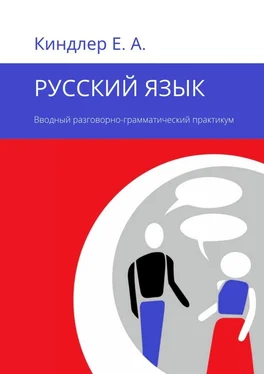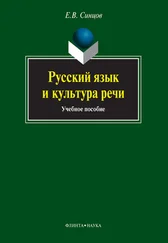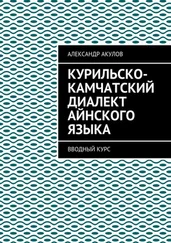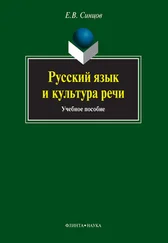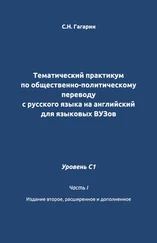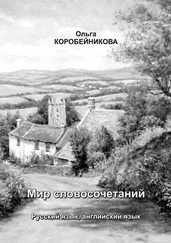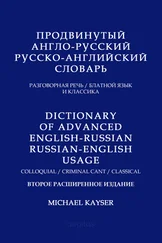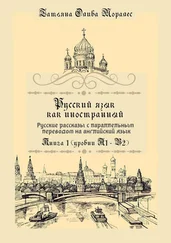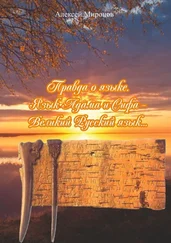Я работаю или отдыхаю
Я пью чай или кофе
но
Я пью чай, но не пью кофе
Я понимаю, но не говорю по-русски
а
Я знаю русский, а она знает английский
Я работаю, а он отдыхает
The conjunction но means but in English. It́s always related to a big contrast between the two parts of a sentence!
We use the conjunction a when therés no strong conflict between the parts of a sentence. It́s only additional information. This is a milder form of contrast. It may also have a connective value.
Упражнение 3. Make two sentences with each conjunction.
Упражнение 4. Read the texts
Words to text:
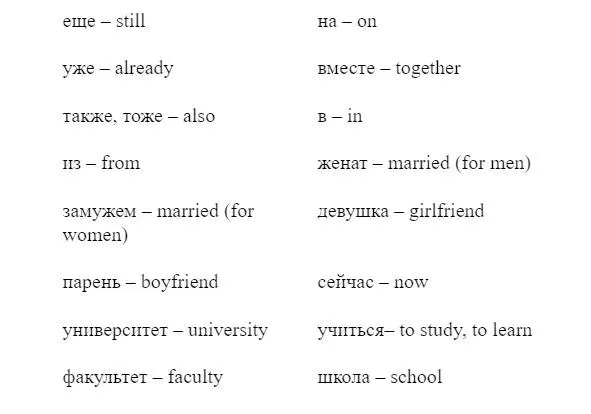
Привет. Меня зовут Алексей и мне 25 лет. Я журналист. Я не женат, но у меня есть девушка. Ее зовут Елена. Ей 23 года. Она экономист.
Привет. Меня зовут Настя. Мне 20 лет. Я студентка, я учусь 5 5 учиться я учусь – мы учимся ты учишься – вы (Вы) учитесь он/она/оно – учится они учатся
в университете, на факультете лингвистики и ещё не работаю. Я не замужем, но у меня есть парень. Его зовут Андрей, ему 21 год. Мы вместе учимся.
Здравствуйте. Меня зовут Мария и мне 35 лет. Я из России. Я учительница. Я замужем. Моего мужа зовут Иван. Он полицейский. У нас есть дети. Моего сына зовут Дмитрий, ему 7 лет. Мою дочь зовут Маргарита, ей 3 года.
Здравствуйте! Меня зовут Ольга. Мне 30 лет. Я врач. Я из Казахстана, но сейчас живу в России. Я замужем и у меня есть семья. Моего мужа зовут Петер, ему 36 лет. Он бизнесмен и у него своя фирма. У нас есть дочь. Ее зовут Герта. Ей 7 лет и она уже учится в школе. Мои родители живут в Астане. Моего папу зовут Олег, ему 60 лет. Он инженер, и он еще работает. Мою маму зовут Галина. Ей 66 лет. Она пенсионерка и уже не работает. У меня также есть брат и сестра. Моего брата зовут Максим, ему 35 лет. Он живёт в Германии. Он еще не женат. Мою сестру зовут Елена. Она живет и работает в Америке. Она замужем и у неё есть дети. Дети учатся вместе в школе.
Hi. My name is Alex and I am 25 years old. I am a journalist. I am not married, but I have a girlfriend. Her name is Elena. She is 23 years old. She is an economist.
Hi. My name is Nastya. I am 20 years old. I am a student, studying at the university, at the faculty of linguistics and still do not work. I am not married, but I have a boyfriend. His name is Andrey, he is 21 years old. We study together.
Hello. My name is Maria and I am 35 years old. I am from Russia. I am a teacher. I’m married. My husband’s name is Ivan. He’s a policeman. We have children. My son’s name is Dmitry, he is 7 years old. My daughter’s name is Margarita, she is 3 years old.
Hello! My name is Olga. I am 30 years old. I am a doctor. I am from Kazakhstan, but now I live in Russia. I am married and have a family. My husband’s name is Peter, he is 36 years old. He is a businessman and has his own company. We have a daughter. Her name is Hertha. She is 7 years old and she is already in school. My parents live in Astana. My father’s name is Oleg, he is 60 years old. He is an engineer, and he is still working. My mother’s name is Galina. She is 66 years old. She is a pensioner and is no longer working. I also have a brother and sister. Maxim, he is 35 years old. He lives in St. Petersburg. He is not married yet. My sister’s name is Elena. She also lives and works in St. Petersburg. She is married and has children. Children study together at school.
Grammar comment:
In the texts we will meet cases. In Russian cases are expressed by changing the endings of nouns and adjectives. This is one of the most difficult things in the language, and each case will be considered separately then. For now, try to remember the endings of nouns in indirect cases regarding some standard situations. We have already said that in Russian indirect cases are used when it concerns to name and age.
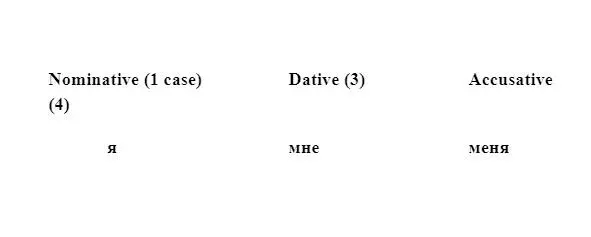
Меня зовут (4 case) – NOT я зовут
Мне 20 лет (3 case) – NOT я 20 лет
Name (4 case)
(masсuline) Моего папу (дедушку, брата, сына) зовут
(feminine) Мою маму (бабушку, сестру, дочь) зовут
(m) твоего, eго, её, нашего, вашего, их
(f) твою, его, её, нашу, вашу, их
Age (3 case)
(m) Моему папе (дедушке, брату, сыну) … год, года, лет
(f) Моей маме (бабушке, сестре, дочери) … год, года, лет
(m) твоему, eго, её, нашему, вашему, их
(f) твоей, его, её, нашей, вашей, их
2) Note:
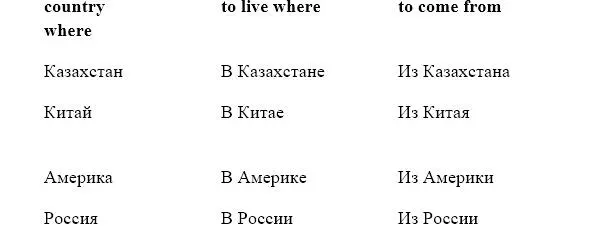
Countries also change endings depending on the case. In Russian almost all countries have either masculine or feminine gender. The endings of the masculine countries – consonantor й, the endings of the feminine countries – а, ия, ея. Depending on the question, where and from where the endings are replaced.
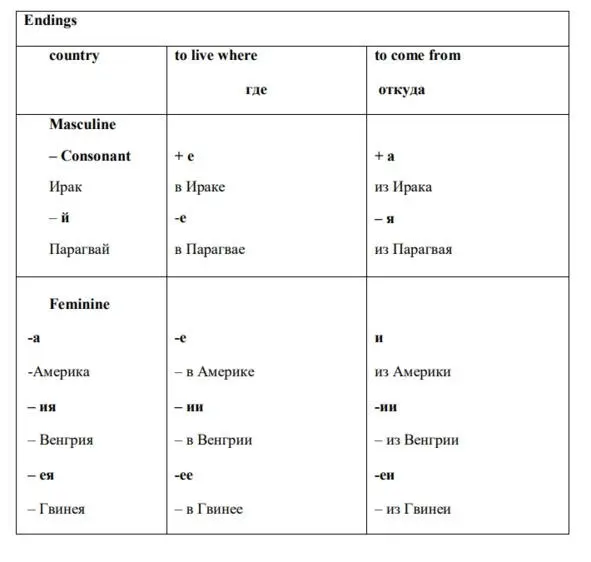
Note:Some feminine countries with hard consonants in the stem have different endings.
Венесуэла – в Венесуэле— из Венесуэлы
Канада – в Канаде – из Канады
Украина – в Украине – из Украины
Аргентина – в Аргентине – из Аргентины
The neuter countries do not change ending
Конго – в Конго – из Конго
Упражнение 5. Write the name and the age of your family members.
Use the pattern
Моего папу зовут…
Моему папе… год, года, лет. Мою маму зовут…
Читать дальше
